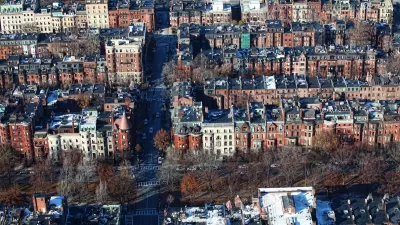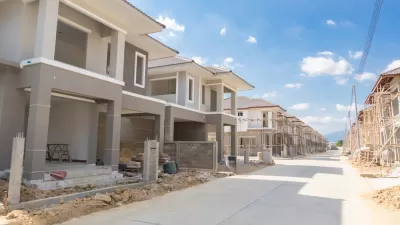Boston is experiencing a period of brisk residential construction—most of which will enter the luxury market. New Mayor Martin Walsh has set the creation of middle class housing as a top priority for the city.
"Mayor Martin J. Walsh, in his first major real estate development initiative, is seeking to dramatically increase production of middle-income housing in Boston as the region’s red-hot property market pushes prices beyond the reach of most average wage earners," reports Casey Ross.
Although there are 6,600 rental and ownership units currently under construction in Boston, only "about 22 percent are considered affordable to households earning between $50,000 and $100,000 a year," writes Ross.
"In downtown Boston, for example, prospective buyers with household incomes of $80,000 could have afforded just 1.7 percent of the homes sold. In the South End, about 2.9 percent of transactions would have been within the reach of those house hunters."
A working group has been assembled, working with the Metropolitan Area Planning Council, to create recommendations for the problem, which should be available in coming weeks. For a preview of what to expect from those recommendations, "Walsh administration officials said they will seek to spur more middle-income housing production in outlying neighborhoods such as Allston, Brighton, Dorchester, Roxbury, East Boston, Hyde Park, and Roslindale."
FULL STORY: Walsh pushes for middle-income housing

Trump Administration Could Effectively End Housing Voucher Program
Federal officials are eyeing major cuts to the Section 8 program that helps millions of low-income households pay rent.

Planetizen Federal Action Tracker
A weekly monitor of how Trump’s orders and actions are impacting planners and planning in America.

Ken Jennings Launches Transit Web Series
The Jeopardy champ wants you to ride public transit.

Crime Continues to Drop on Philly, San Francisco Transit Systems
SEPTA and BART both saw significant declines in violent crime in the first quarter of 2025.

How South LA Green Spaces Power Community Health and Hope
Green spaces like South L.A. Wetlands Park are helping South Los Angeles residents promote healthy lifestyles, build community, and advocate for improvements that reflect local needs in historically underserved neighborhoods.

Sacramento Plans ‘Quick-Build’ Road Safety Projects
The city wants to accelerate small-scale safety improvements that use low-cost equipment to make an impact at dangerous intersections.
Urban Design for Planners 1: Software Tools
This six-course series explores essential urban design concepts using open source software and equips planners with the tools they need to participate fully in the urban design process.
Planning for Universal Design
Learn the tools for implementing Universal Design in planning regulations.
Heyer Gruel & Associates PA
Ada County Highway District
Institute for Housing and Urban Development Studies (IHS)
City of Grandview
Harvard GSD Executive Education
Toledo-Lucas County Plan Commissions
Salt Lake City
NYU Wagner Graduate School of Public Service





























